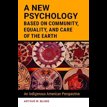A New Psychology Based on Community, Equality, and Care of the Earth: An Indigenous American Perspective
A New Psychology Based on Community, Equality, and Care of the Earth: An Indigenous American Perspective
€ 52,99
Explains Native American psychology and how its unique perspectives on mind and behavior can bring a focus to better heal individual, social, and global disorders.
Psychology is a relatively new discipline, with foundations formed narrowly and near-exclusively by white, European males. But in this increasingly diverse nation and world, those foundations filled with implicit bias are too narrow to best help our people and society, says author Arthur Blume, a fellow of the American Psychological Association. According to Blume, a narrowly based perspective prevents "out-of-the-box" thinking, research, and treatment that could well power greater healing and avoidance of disorders.
In this text, Blume explains the Native American perspective on psychology, detailing why that needs to be incorporated as a new model for this field. A Native American psychologist, he contrasts the original culture of psychology's creators—as it includes individualism, autonomy, independence, and hierarchal relationships—with that of Native Americans in the context of communalism, interdependence, earth-centeredness, and egalitarianism. As Blume explains, psychological happiness is redefined by the reality of our interdependence rather than materialism and individualism, and how we do things becomes as important as what we accomplish.
- Includes a glossary of Native American concepts and terms
- Explains the Indigenous American view of creation as community, humans' place in the social order as one of equal partnership, and the importance of connection to the earth, relationships, spirituality, sacredness, and the place of cultural humility
- Describes cultural myths that permeate contemporary psychology
- Details how the vestiges of colonialism traumatized people, contributed to health disparities, and left people divided, in addition to damaging the planet
- Illustrates how oppression victimizes both oppressor and the oppressed
Explains Native American psychology and how its unique perspectives on mind and behavior can bring a focus to better heal individual, social, and global disorders.
Psychology is a relatively new discipline, with foundations formed narrowly and near-exclusively by white, European males. But in this increasingly diverse nation and world, those foundations filled with implicit bias are too narrow to best help our people and society, says author Arthur Blume, a fellow of the American Psychological Association. According to Blume, a narrowly based perspective prevents "out-of-the-box" thinking, research, and treatment that could well power greater healing and avoidance of disorders.
In this text, Blume explains the Native American perspective on psychology, detailing why that needs to be incorporated as a new model for this field. A Native American psychologist, he contrasts the original culture of psychology's creators—as it includes individualism, autonomy, independence, and hierarchal relationships—with that of Native Americans in the context of communalism, interdependence, earth-centeredness, and egalitarianism. As Blume explains, psychological happiness is redefined by the reality of our interdependence rather than materialism and individualism, and how we do things becomes as important as what we accomplish.
- Includes a glossary of Native American concepts and terms
- Explains the Indigenous American view of creation as community, humans' place in the social order as one of equal partnership, and the importance of connection to the earth, relationships, spirituality, sacredness, and the place of cultural humility
- Describes cultural myths that permeate contemporary psychology
- Details how the vestiges of colonialism traumatized people, contributed to health disparities, and left people divided, in addition to damaging the planet
- Illustrates how oppression victimizes both oppressor and the oppressed
| Prijs | Verzendkosten | Totaal | |
|---|---|---|---|
€ 52,99 | € 0,00 | € 52,99 |
Alternatieve producten
© 2016 - 2024 aanbiedingchecker

